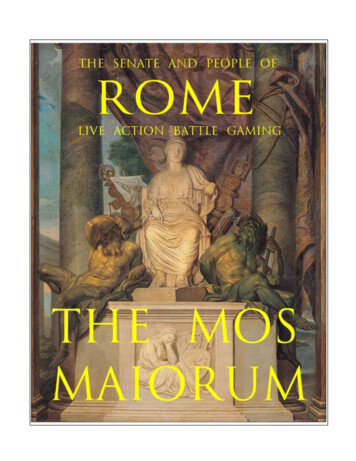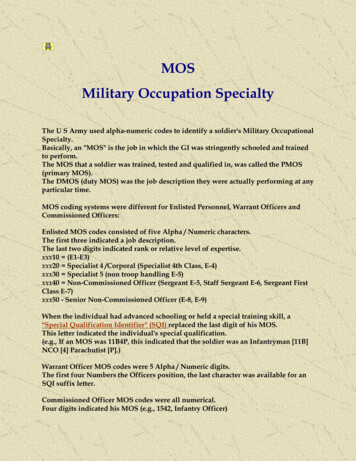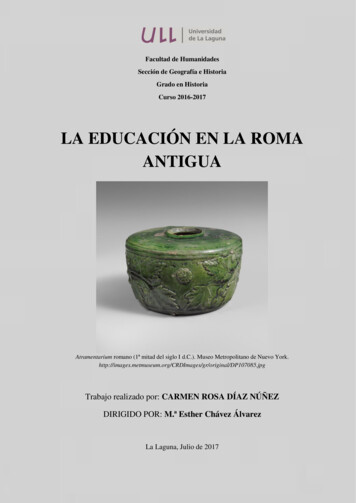
Transcription
“For who is there so worthless and lazy that he would not wish to know how and under what kind ofgovernment the Romans have brought under their sole rule almost the whole of the inhabited world in lessthan fifty-three years; for nothing like this has ever happened before. Or who can be so devoted to anyother subject of study that he would regard it as more important than the acquisition of this knowledge?”-Polybius (I, I, 5-6)MOS MAIORVMLiteral translation: "the ways of our ancestors". Rome's great empire was founded on the adherence to oldtraditions that originally ensured her rise to dominance over her neighbors. This catch-all phraseencompassed a great many things about ancient Roman culture. Rome's religions, martial traditions,government, law, etc. The mos maiorum was the way things were done in Rome, the sense of what aRoman perceived as fitting and proper. As such, it is the most fitting and proper title for our society'sguidelines and structure. The mos maiorum transcends actual law. It represents and encompasses ourtraditions and policies. Our laws are included herein, and are a part of the mos maiorum. The mosmaiorum is anything written or unwritten, anything stated or implied about what Rome is. Rome'sgreatness is owed directly to our adherence to the mos maiorum.DEDICATED TO THE SENATE AND PEOPLE OF ROME,THEN AND NOW. . .COPYRIGHT 1994 – 2019All opinions contained herein are those of the author alone. All non-proprietary pictures and othermaterial was obtained through approved channels or from the public domain and is not intended toinfringe any copyrights. This document may not be reproduced in whole or in part without the expressedwritten permission of Sean M. Richey.Library of Congress Catalog Card Number TX-6-360-513in the ConsUlship of ARTHOL and BRUTILUS
TABLET OF CONTENTSINTRODVCTION . IGETTING STARTED . IIROMAN CITIZENSHIP .IIION THE QVALITIES OF A GOOD ROMAN SOLDIER. VCLOTHING . VIIISACRAMENTVM . IXROMAN MILITARY .XBATTLE SCHEDVLES .XWEAPONRY . XICORDIALITY . XIISALVTE . XIILEGIONS . XIICREATING A LEGION . XIIIRANK STRVCTVRE .XIVPROMOTIONS. XVOFFICER RANKS . XVLEGION COMMANDERS . XVIIMILITARY AWARDS . XIXROMAN SOCIETY .XXIISOCIAL STATVS. XXIIIROMAN FAMILY. XXVIROMAN GOVERNMENT . XXVIITHE SENATE. XXVIIROMAN OFFICIALS & MAGISTRATES. XXIXELECTIONS. XXXIIROMAN RELIGION . XXXVLEX ROMANA . XXXIXAPPENDIX I – ROMAN CONTRACT OF CITIZENSHIP. XLIIIAPPENDIX II – SAMPLE LIST OF ROMAN NAMES .XLVAPPENDIX III – SAMPLE BALLOT SHEET . XLVIAPPENDIX IV ROMAN CITIZEN DATA SHEET. XLVII
INTRODUCTIONDo you want to BE a Roman Gladiator? Legionary? Centurion? General? Senator? We've been living your dreamfor years!Roman might was made legendary by the valor of her glorious Legions. Sandaled feet marched to the clash ofarms through a river of blood. The Legions carved out Rome’s expanding dominion through battle and butchery,from Britain to Egypt. From a patchwork of conquests, the diverse nations and cultures of three continents weretransformed into one world, one Empire!Do you ever wish you could have made history, earning eternal glory in Rome’s wars? Now's your chance! TheLegions still expand the Empire's dominions every month. We share a fascination with history and get to enjoy it asa fast-paced, action packed sport! The Washington, D.C. Metropolitan area boasts a wide variety of medievalcombat organizations, including Dagorhir Battle Games and the Society for Creative Anachronism (SCA). Romehas enjoyed participation in local medievalist combat circuits since 1987, and we welcome you to join our fun. If thissounds like your kind of fun, Rome wants you!Historic Romans understood how to conquer and reign. Using the principles of war that established the RomanEmpire as supreme, we have duplicated their success. We are always recruiting, building new Legions to share ourpeerless glory. We offer numerous advantages to people who share our interest. We will train you to usecompetitive combat techniques. We will help you construct armor and weapons that will help ensure yoursuperiority on the fields of battle. You'll enjoy the exhilaration of experiencing a safe medieval combat simulationwith a winning team. In return, Rome expects your regular participation as a combatant at our events, and yourdevoted adherence to our high standards of honor, sportsmanship, and loyalty.Rome is about fun and teamwork, using organization to achieve success. We've achieved national fame and gloryin the Dagorhir Battle Game Association and in the Society for Creative Anachronism. Romans strive to be the bestof friends, and the most challenging of opponents. We don’t believe in having "enemies," being of the opinion thatall "medievalists" share a common interest that should unite us. But friendly competition has its place on thebattlefield, where glory is earned. Whether your interests lie in joining us as a citizen of Rome, fighting with us atRagnarok or Pennsic, or even fighting against us in the medievalist societies we recommend, please contact us.We welcome all who share our interest in the glory and majesty that was (and is) Rome.Ave Legions of Rome!
GETTING STARTED: The ROMAN ROADBecoming a Roman may seem overwhelming to the uninitiated. However, while nothing truly great is ever easy, it isnot that hard to get started out on the Roman road. And as we all know, all roads lead to Rome.Rome is first and foremost a military organization. We focus on medieval style, full-contact mock combat. Anindividual does not really need that much to get started. The minimum requirements are: A red tunic with a belt A short sword A desire to be a Roman Attendance at a Roman event (see the Schedule on the website for Roman events)It may seem overwhelming to join us at a battle with 100 people on the field or a war with 3,000 people on the field.Practices are a great, low-key way to meet Rome and learn to do what Rome does best, fight!Rome conducts practices each week, weather providing. Most of our membership range from Northern Virginia toBaltimore, so we are spread far enough to warrant multiple practices. A local practice will include people within a 30minute driving distance.Practices are usually in the evening, on a weeknight and last for 2-3 hours. Garb (costuming) and armor are notworn or used at practices. Loaner weapons are available for newcomers, and veterans will be there to train you andshow you how to get equipped. Check the Roman website (www.romanempire.net) under Schedule for practicetimes and locations.Starting out is easy, and we’ll help you along the way. This rest of this document details what is expected fromevery Roman. We have all lived up to those expectations for years. Many of us strive to surpass them. That’s whatthat sets us apart and makes us great. We act together for the dream of our great Roman State. Romans live thedream and we invite you to share that dream with us. There is truly nothing better.
ROMAN CITIZENSHIPSo, you want to be a Roman? While various requirements are detailed throughout this book, they are consolidatedthem here for easy reference.A Roman Citizen will:I.II.III.IV.V.VI.Camp with Rome's Legions at Wars we attendReceive a hard copy of the Mos Maiorum and all subsequent updates;Receive emails, detailing Roman-related events and highlights, war registration information, andrecognition of the efforts and contributions of citizens throughout the empire;Receive reasonable assistance, guidance and/or reference materials constructing weapons, armor,and equipment, or in finding local medieval combat societies, Roman reenactment groups, and liveaction role-playing games;Have their character identity and social status documented as a member of the People of Rome, and acitizen of the Roman Empire.Have the offer of citizenship extended to them by the Imperator of Rome. This supersedes all otherrequirements.SOLDIERS (MILITARY CITIZEN)To enlist in our glorious Roman Legions as a soldier, you must:I.II.III.IV.V.VI.VII.VIII.IX.Fight with Rome at any battles or Wars we attend;Fill out the Roman Citizen Data Sheet provided to you at your first event;Attend at least six months of battles as a Petitioning Auxiliary (see Auxiliary) or at least two full Wars;Take and follow the military oath (see Sacramentum);Agree to and sign the Roman Contract of Citizenship;Own and wear a red tunic (see Clothing);Paint the Roman shield symbol on your shield if/when you have one;Understand and adhere to the laws set down by the Senate and People of Rome (see Lex Romana);Find a Legion Commander willing to accept you into his Legion.Roman military service is a long-term commitment. Rome has a lot to offer a new recruit. Rome is the best unit youwill ever have the privilege to join. But understand that your wish to join must be more for Rome's greater glory thanfor your own. Referring to the first martial law of the Lex Romana: Rome will not be taken advantage of.
CIVILIANS (CIVILIAN CITIZEN)To become a private civilian of the Roman Empire, you must:I.II.III.IV.V.Fill out the Roman Citizen Data Sheet provided to you at your first event;Understand and adhere to the civil laws set down by the Senate and People of Rome(see Lex Romana);Own a Roman costume and wear it at any events you attend in your non-combatantcapacity;Take and follow the military oath (see Sacramentum).Civilians are expected to contribute to Roman martial readiness at every day of battlethey attend. Examples include helping people get into armor, water bearing,Heralding/Marshalling, toting a wagon from camp to the field and back, setting up asun shade on the field, and taking some personal responsibility to help soldiers geton and off the field in a noticeable way at least once an event.Speaking to the last responsibility, established opportunities exist. Citizens,including petitioning and prospective citizens, if they so choose, are authorized to provide apost-battle snack at Rome’s wars. They will be allotted 15 per battle day from the war chest.This transaction must be approved by the Camp Prefect.Civilians have no need for, or access to, Roman military secrets. Neither are they bound byRoman martial laws. Our focus is obviously military, but civilians contribute significantly toRome and will earn recognition for their contributions.Civilians may not hold elected office, Rome is a military state. However, they may be appointedby a magistrate or serve on a committee.ASSOCIATESWe've often met fighters with Roman personas and armor at Pennsic and other wars we attend. You are welcometo fight with us on a temporary basis. The more the merrier! We only require that you adhere to our standards ofhonor and sportsmanship while fighting in our ranks. We all want to be part of something greater, and what couldbe greater than Rome?
ON THE QUALITIES OF A GOOD ROMANSOLDIERWe get asked quite often “What are the qualities that Rome looks for in apetitioning auxiliary?” This is understandable, given that Rome always boastsseveral new and petitioning citizens. Rome does not accept, or want, everyone.This is not to intimidate potential new citizens. It is designed to protect Rome byensuring Roman superiority. The following pages should be helpful in definingthose desirable characteristics.Let me begin by explaining the process. You tell a Roman that you wish to petitionfor citizenship, that you want to join Rome. Generally this person will be a Legioncommander or Dominus. Word of your intentions will be spread among allOfficers, and you will be watched. This process is one we regard as sacred,though we deal with it very informally amongst ourselves. Each petitioner is aseparate case. It is the responsibility of your Legion commander to screen youfirst. To some extent, you have passed their test by the fact of your presence. Ifyou embarrass them on the field, chances are they won't even bring you back.After several events, I will ask each Officer his opinion on your merits, both goodand bad. We have an expression among ourselves, that someone either is or is not "Roman material." Based onthe Commanders' statements (which will have NO political basis) and Dominus' own opinions, a judgment will bemade based on what is best for Rome. This no doubt will eventually infuriate someone who is trying to assemble aLegion. Numbers are beneficial if used well, but numbers alone mean nothing. Rome has defeated as much as fourtimes our number. Your auxiliary status will last at least six months (or the duration of two wars depending on thejudgment of the Imperator). This is not intended to discourage you. This allows Rome's Officers ample time toreview and assess your worth. I shall go on to explain those characteristics that define Roman material.First and foremost: Loyalty. Loyalty to Rome, loyalty to the Imperator, loyalty to your Legion Commander. Thebottom line is can you be trusted? If not, we're wasting each other's time. Every good Roman understands thatRoman greatness is based on sacrifice. The sacrifice of some free will for the betterment of the group as a whole.This is a major facet of the loyalty that is an ultimate prerequisite expected of every citizen, petitioning or otherwise.Secondly: Dedication. You must ask of yourself, "Am I in this for the long haul?" I'll be asking it of you. Are yougoing to come out and fight regularly for at least a year or two? If not, you're a waste of time. We want you out atleast once a month. There are lots of old Romans who, because of the many responsibilities that tend to weigh usdown increasingly with age, are unable to attend more than a few times a year. This is all right. They've put in theirtime, and Rome has benefited greatly over the years because of their efforts. Rome expects the same participationfrom you, at least initially. There are a lot of rewards, granted, and as a citizen you're entitled to your full share ofarmor, training, experience, and glory. But you must be worth it. Along with dedication is your adaptability andwillingness to go with the army. If Rome can only expect your support in a single organization, fight with us as along-term auxiliary. Each medieval society at best represents one third of our campaigning. Don't be a peasantafraid of journeying too far from home. Lastly, understand this: your agreement to join Rome is a permanent one.Not for one year or two years, but forever. Every time you step on to a battlefield for the remainder of your life, youare a Roman. (It eludes me why anyone should wish to be otherwise.) The Roman Empire is not a fad or temporaryphenomenon. In various forms it has existed since 1987. I always emphasize this with all the gravity I can muster:do NOT make this decision lightly.Thirdly: Attitude. This is an abstract that is difficult to describe, but we all have a feeling for it and it is an importantconsideration. Do you fit in? Are you a natural fighter and conqueror, or a geek who just doesn't want to lose? Do
you want to be a Roman? We want winners, not whiners. We are all sick of thepeople who want to be part of the best unit in medievalism, but don't want tofollow any of the tenants we set down or integrate themselves as a Roman. "Idon't wanna wear a red tunic", "You can't tell me what to do", "Dominus is ajerk", "I wanna fight Florentine", "I'm a skirmisher, I don't wanna fight on theline", "Harn doesn't like me." WHY are you even here? The answers to thesequestions are: "You will", "We can", "I'm not", "You can't", "You will", and "No, heprobably doesn't." Do you think that Rome is great by accident? No, it is bycalculated design that Rome is great. If you think you can do better I welcomeyou to try. If your presence among us weakens us, we don't want you. The onlyexceptions to this are raw, green recruits who have never fought. These are aninvestment in the future of the Roman Empire. In fact, their personal fightingability is barely a consideration beyond what rank they will begin as when/if youare enfranchised as a citizen. It is your potential that concerns us. If you are nota good fighter when you enlist, you will be. Attitude is far more important. Wewant people who will contribute and not detract from the group. We want peoplewho want to win, but will not break the rules in order to do so. We want peoplewho will put Rome's best interests ahead of their own medievalist career. Wewant people who will preserve and protect our image, honor, reputation, anddignity by the way they deal with outsiders and present themselves internallyand externally. We want people who will take the time and energy into betteringand equipping themselves; the Roman way. Why be an exception to the verythings that make us great?Fourthly, and this is tied directly to the third: Intent. I will ask you WHY you want to join. Perhaps I should not givethis one away, but the biggest danger sign is when the response is, "For the armor?" "Let's see how you do overthe next six months," will be my likeliest response. Rome's assistance, as stated in the sacred Lex Romana MartialLaw number I, is not based on altruism. Your greatness makes Rome great. You should be joining as much forRome as for yourself. If you don't want to follow ALL of Rome's laws and guidelines, fight with us as an auxiliaryforever. That's fine. If you leave, or start your own country, there is no violation, no betrayal. We're still happyfriends. If things don't work out, return at your leisure. You won't enjoy the benefits of citizenship, but there isnothing worse than being an ex-citizen. Status as a Roman auxiliary still puts you far ahead of the rabble, and youget to fight with Rome rather than against. It's a happy alternative. Think about it. If this is your choice, we'llcompletely respect your honesty and your decision.It must be emphasized that your agreement to join Rome as a permanent citizenis between you and the Imperator, Senate, and People of Rome. Not yourcharacter, not your medieval persona, but YOU agree to join! The military oath,or Sacramentum, applies to you personally. Roman citizenship is bestowedalong with Rome's trust in you. If you foreswear your oath or betray Rome'strust, you invite harsh penalties for your actions. Joining Rome is PERMANENT.We will welcome you, help you, include you, and give you many opportunities toprove yourself. But consider your decision carefully. Further, Rome does notrecognize such fantasy organization conventions as multiple characters. Yourrank and status are YOURS, regardless of the character you portray on a givenday.Rome is growing at a drastic rate. Being the best affords us the luxury of beingable to pick and choose, and we must be careful if we are to ensure lastingRoman domination. But we do want you to be a Roman if it is what you trulywant. To truly want it, and to adhere to the guidelines and standards we set, iswhat it really takes. Ask yourself honestly. Most people, if honest, would hesitateto enter into such a binding commitment. In fact I tend to distrust those whomake the decision with alarming ease. Rome transcends friendship. Rome is
peerless. Rome is eternal. Rome is a dream built on battle and butchery, on victories and triumphs. Being a Romanmeans learning to be a soldier rather than a mere warrior. Being a Roman means being a professional rather thanan amateur. Being a Roman means tying your fate forever to Rome's. Many feel such "limitations" a heavy andinescapable burden. If you feel this way, you are not Roman material. But for the truly dedicated classical/medievalcombat enthusiast, Rome is the best decision you will ever make.-Allaricus Xirinius Dominus, ImperatorCommentaries III, December 10, 1995In the Consulship of Amroth Valerius Baculus and Tobias Deloricus Desponius
CLOTHING"The clothes make the man." This cliché is probably as old as Rome herself.However, in medieval combat it is all too true. People equate superior garb, or “kit,”with veteran status. And not only does having a good kit make you appear moreformidable, but it also makes the unit altogether more impressive. Nothing is moreimposing than the truly awesome spectacle of several Legions maneuvering inunison, clad in red tunics and steel. This image itself goes a long way towardsdefeating our opponents psychologically. Anyone participating with Rome musthave a costume by their third battle or they will not be allowed to fight with us.The bare minimum garb required of a Roman is a red wool, linen, or cotton tunic (tobe worn over any under-tunics). A Roman should wear a red tunic whilerepresenting Rome in any martial capacity, whether fighting, refereeing or standingguard. Wearing a red tunic helps ensure that your fellow Romans can recognizeyou by your apparel at a glance. Romans in combat tend to be inordinatelyparanoid. Many are our auxiliaries and raw recruits who have been slaughteredinadvertently for wearing a brown tunic within striking range of their fellows. ARoman in red is also far likelier to get assistance in dire need than some nobody innon-descript colors.When you are not fighting or in uniform, you should still dress like a Roman. Theeasiest and most obvious way to do this is to wear a red tunic. On the Romanwebsite links section, there are numerous links to sites with accurate depictions ofRoman military uniforms and civilian dress. This is exactly the kind of authenticity we like to see reflected in eachRoman's accessories. An advantage of Rome is the extraordinary wealth of documentation and reference materialavailable in books and online. For civilian dress, feel free to accessorize with the clothing of the many nationalitiesthat composed the empire. However, we do consider it an expression of national pride to don Roman garb.Remember that the quality of your kit is an essential prerequisite for military rank.There are a few restrictions we insist upon. Some garb requirements/restrictions are based on social status (seethe Social Status section) or rank (See the Rank section). Unless you are a Patrician, Equestrian, or LegionCommander (see Nobles and Legion Commanders) you should have NO PURPLE in your costume at all. Thereare few costume limitations we insist upon. If you are among the above three mentioned, you should have a purplestripe of the appropriate width running down your tunic or cape regardless of your costume style or nationality.Another major restriction is the use of brass like metals in your kit (See Centurion). Military uniform and dressrequirements will be enforced regardless of status.One crucial element in the Roman wardrobe is a toga or stola. We would definitely like every Roman to have a togaor stola. We have held annual toga parties and will continue to do so. There will be Senate meetings and otheroccasions where Roman formal wear is appropriate. A toga was the exclusive privilege of the Roman citizen.For combatant footwear, we highly recommend combat or hiking boots. They are not by definition "period", but theydo carry martial associations and Rome did have similar models. Many combatants use engineer boots or high-topmoccasins. These lack both the traction and ankle support to function adequately in combat. The same is true ofsandals, unfortunately. Nice apparel, but dangerous in combat. Sandals are best worn when you’re not fighting.Rome will be happy to assist and advise you with all your garb needs. You have only to ask.
SACRAMENTUM – OUR ROMAN OATHI,, swear to honor and defend the Mos Maiorum, to enthusiastically followthe commands of the Imperator and all those with lawful authority, uphold Rome’s dignitas, never to dessert, andnot to shrink from death on behalf of the Roman State.
ROMAN MILITARYBATTLE SCHEDULES AND ATTENDANCERome's officially scheduled campaigns are published at the beginning of every year. Our schedule is available on The Roman website (www.romanempire.net), Our public Facebook page (www.facebook.com/SenatusPopulusqueRomanum) Our private Facebook GroupOfficial events include battles and even practices, of which there is typically one event per month. The Senate mayalso give certain events special recognition under Roman law, and these are typically the Wars.Rome attends two major Wars every year. One is the SCA’s "Pennsic," held every August in Pennsylvania. Theother is Dagorhir’s "Ragnarok," held every June in Pennsylvania. All citizens will receive the necessary registrationinformation for these wars through Roman periodicals.Every day of battle in which Rome participates at a War counts separately towards each soldier’s annualattendance. That is, each soldier’s day of battle at a War will be tallied with his/her annual total as if that day were asingle event. A “full” War is defined as at least five days of attendance at the event and taking the field with Romefor at least four of those days.Important regional battles include Dagorhir’s Gates of Fire and Battle of Badon Hill. These are held in mid-westernPennsylvania. Along with Wars, Rome’s Legions and Officers are required to attend at least one major event peryear.Attendance is vital to Rome's continued greatness, and is a responsibilitywe all accept. It is our responsibility to each other, to our respectivecommanders, and to Rome. Each Officer rank requires a minimumattendance every year, and regular attendance is a consideration forcitizenship and promotions.While every Roman is expected to try and attend events, important battlesand wars have increased emphasis and rewards. Non-battle events do notcount towards attendance. Senators and Magistrates must attend Senatemeetings and fight at the major events when Senate meetings areconducted, in order to maintain their positions on the Senatorial Rolls.Legion commanders must keep their Legions active, or disband. Regularbattle attendance is important to Rome's preeminence. More detailedinformation on Rome’s attendance expectations is provided in the pagesthat follow.The lex Arthola Claudia states that refereeing may only count towards a citizen's attendance once every sixmonths.
WEAPONRYBelow are the weapon choices available:I.II.III.Sword, shield and javelin (gladius, scutum, et pilum)Spear (hasta or lancea)Bow and arrows (arcus et sagittae)Get used to this concept: the shield wall is everything. If you do not wish to be ashieldman, choose the other weapons that can most readily support the shield wall.Well placed spearmen and archers, with the wall's protection, can both fend offflanking attacks and decimate an attacking line's advance.Rome takes a very pragmatic approach to warfare. We've been at it a long time andwe like to win. There are no Romans even allowed to even use a two-handedsword. Why? Because that soldier has no defense and must expose himselfphysically to attack with his/her limited reach. The same is more true of those fantasy novel enthusiasts who dreamromantically of fighting with two swords. They are easy pickings for spearmen and archers. Limited combateffectiveness among our people weakens the Legions as a whole. If you insist on weakening your group, please gofight with the rabble; we'll pick you off with javelins before we engage your shieldmen.Does this sound harsh? A novice will get trounced without the teamwork we emphasize coupled with the mosteffective and high-tech weaponry available. If you get trounced, holes can be made in the shield wall that can spelldeath for your fellow Romans. In recruiting you, we accept this risk. But we insist that you weaken the group as littleas possible.Marius taking aimCatia with sword and shieldH
IX. Find a Legion Commander willing to accept you into his Legion. Roman military service is a long-term commitment. Rome has a lot to offer a new recruit. Rome is the best unit you will ever have the privilege to join. But understand that your wish to join must be more for Rome's greater glory than for your own.










